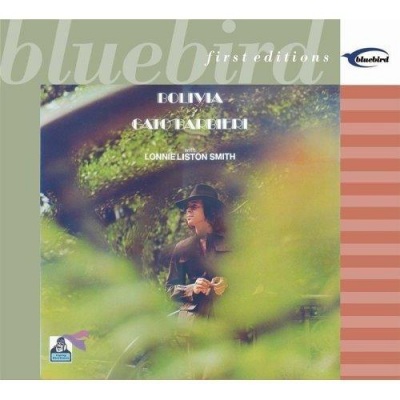
Under Fire
by Don SnowdenUnder Fire is Gato Barbieri in his early-'70s prime, when the Argentinean tenorman's transition from the avant-garde to exploring his South American continental routes still hadn't passed beyond the pale into flaccid fusion. He's joined by a pretty stellar band: his regular pianist Lonnie Liston Smith (before he fuzaked out), Airto Moreira and James Mtume on drums and percussion, the veteran Roy Haynes guesting on "El Parana," a young John Abercrombie on guitar and Stanley Clarke in his young lion-of-acoustic-bass phase. Barbieri floats in the background of "El Parana" before kicking into the song proper at an accelerated tempo. More than improvising per se, his trademark was the emotionally charged sonic stamp he put on the melody (check the intro to the ballad "Yo Le Canto a la Luna," where Barbieri sounds like he's aiming to blow down walls) that made clichés like "Latin passion and fire" sound like, well, the real deal. It also provides a good counterpoint to the exuberant playing of the group -- Smith's solo shows the impact of his years with Pharoah Sanders, but it's Clarke and the rhythm section that really drive the piece while Abercrombie tosses in fills here and there."Antonico" features double-tracked Barbieri and the strongest improvisation (so far) at the end, while Brazilian songwriter Jorge Ben's "Maria Domingas" fades in with a full head of steam thanks to Abercrombie and Clarke dueling over Moreira and Mtume. Barbieri's echoed yelps give way to a deeply lyrical sax melody -- he does a lot of similar dynamic shifts here -- before Abercrombie's guitar comps re-start the up-tempo with Clarke effortlessly loping on as the octave-leaping anchor for Barbieri's searing statement of the theme. "El Sertao" opens with Barbieri squeaks over Smith's echoed Fender Rhodes trills, a Clarke foundation riff, and Abercrombie's comps before Barbieri enters full-force. The music stays light and buoyant before another downtempo shift builds to a climatic coda with Clarke shining. Even the longer pieces are over before you know it so, although Under Fire doesn't quite match the charged intensity of Fenix or El Pampero, it leaves you wishing for two things. First, that there were outtakes to include here because you never come close to getting tired of the music -- double the music would mean double the fun. And what a shame that Carlos Santana, who was just entering his Devadip phase, never recorded with Barbieri at this point in their careers because that combination had the potential to create some pretty incredible music.
